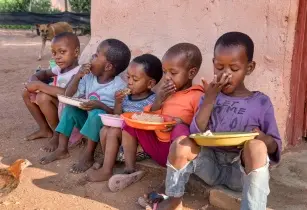The United Nations World Food Programme (WFP) welcomed a US$10.7mn grant from The Rockefeller Foundation to help vulnerable children get better access to nutritious food through school feeding programmes in Benin, Ghana, Honduras, and India
The two-and-a-half-year initiative focuses on including fortified foods in school meals as well as advocating for more nutritious food throughout the programmes. In Benin, Ghana and Honduras, the project is expected to directly impact the lives of more than one million school children. The project will also promote local food production, benefiting smallholder farmers and provide school cooks with information on optimal nutrition for children.
The newly announced project builds on a previous grant to WFP from The Rockefeller Foundation to address malnutrition among children in Burundi, Kenya and Rwanda by bringing fortified beans and fortified wholegrain maize meal into school meals. To support this transition in those countries, WFP is working with value chain actors and medium-scale millers in their shift to wholegrains, which contain five times more nutrients than refined grains.
The grants are part of The Rockefeller Foundation’s Good Food strategy, which focuses on increasing access to affordable, healthy food; reducing greenhouse gas emissions in the food system; and expanding economic opportunity for small-and mid-size food producers. This new initiative will also contribute to the School Meals Coalition, which brings together 73 countries committed to ensuring that by 2030 every child worldwide receives a healthy, nutritious daily meal in school.
“WFP and The Rockefeller Foundation share a commitment to ending hunger, strengthening food systems and ensuring life-long prosperity for all,” said Carmen Burbano, director of the World Food Programme’s School Feeding Division. “This project advances the World Food Programme’s 60-year support of national school feeding programmes but reaches even farther, aiming to transform the systems that bring food to school children and their families.”





